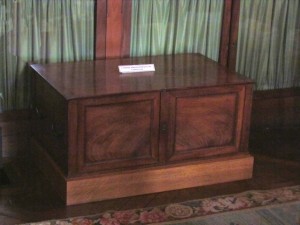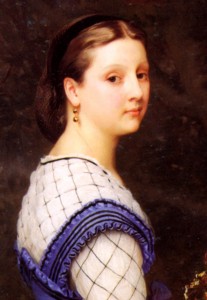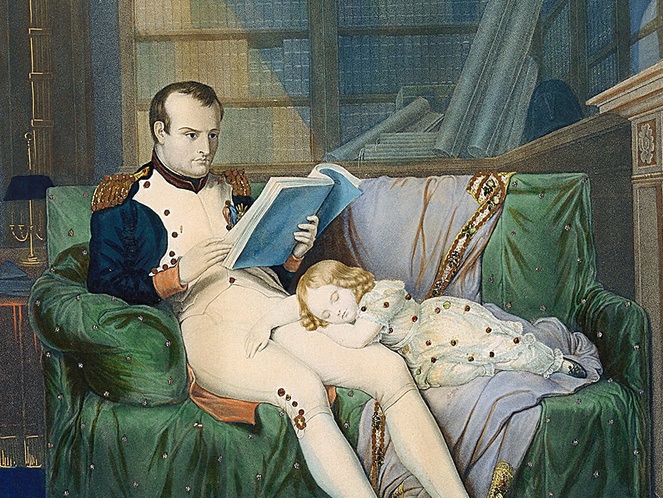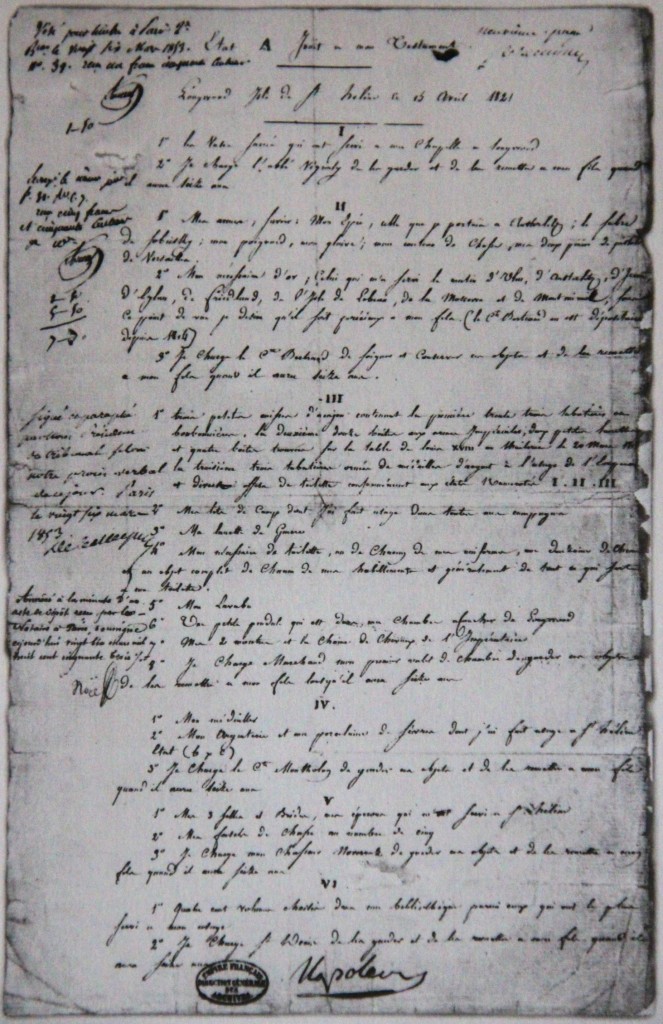My last post covered a few of the ways Napoleon Bonaparte filled his days during his five-and-a-half-year exile on St Helena Island. However, his most important pastime—the one he did every day—was reading.
Throughout his life, Napoleon was a voracious reader and book collector. As an impoverished young man, he lived a monkish life, often skipping meals and entertainment to purchase books. As a general and emperor, he carried a traveling library in a mahogany chest on all his journeys. So it’s no surprise that, during his enforced “retirement” on St Helena, Napoleon read and reread his favorite volumes as well as any new ones he could obtain.
 Napoleon’s books reflected his broad interests. Of course, there were the histories: Arrian on Alexander the Great, Livy and Tacitus on Rome, Barrow on England, among many others. Plutarch’s Lives of Noble Grecians and Romans was an early and perennial favorite. He preferred The Illiad to The Odyssey. Always open-minded about religion, he’s known to have read not only the Bible, but also the Koran and the Indian Vedas. In addition, he read science, philosophy, law, and geography.
Napoleon’s books reflected his broad interests. Of course, there were the histories: Arrian on Alexander the Great, Livy and Tacitus on Rome, Barrow on England, among many others. Plutarch’s Lives of Noble Grecians and Romans was an early and perennial favorite. He preferred The Illiad to The Odyssey. Always open-minded about religion, he’s known to have read not only the Bible, but also the Koran and the Indian Vedas. In addition, he read science, philosophy, law, and geography.
But he also enjoyed poetry and fiction. On St Helena, he reread plays by Molière, Racine, Voltaire, Beaumarchais, and the ancient Greek authors. His favorite epic poems were Tasso’s Jerusalem Delivered and Macpherson’s Ossian. Perhaps surprisingly, he loved tragic romantic novels. He reread Bernardin de Saint Pierre’s Paul et Virginie and Goethe’s Sorrows of Young Werther many times.
Napoleon didn’t just read alone. Memoirs by members of his St Helena entourage recall long evenings after supper when all remained around the table or moved to Longwood’s salon to listen to the Emperor read aloud.  Madame Albine de Montholon, for example, describes an evening when Napoleon read Voltaire’s tragic play Zaïre over dessert.
Madame Albine de Montholon, for example, describes an evening when Napoleon read Voltaire’s tragic play Zaïre over dessert.
In her memoir, she says that when reading aloud, Napoleon’s style wasn’t “remarkable, but interesting. He paused over what appeared to him to be wrong or right, and expressed his opinion with true and beautiful feeling.” His secretary Las Cases mentions him reading from the Bible, while commenting on the places he had visited during his Egyptian Campaign, which had extended into Syria. Still others bemoan how difficult it was to stay awake as Napoleon read on and on.
All that reading had encouraged young Napoleon Bonaparte to believe that he, too, could be a Caesar or an Alexander. He must have wanted his own son to have the same exposure to knowledge and ideas. In his Last Will and Testament, written on St Helena and finalized on April 15, 1821, less than three weeks before he died, he added the following instruction (visible at the bottom of the page between the numeral “VI” and his signature and translated here):
- Four hundred books chosen from my library, among those I used the most.
- I instruct Saint-Denis [one of his valets] to keep these things, and to give them to my son when he will be sixteen.
Unfortunately those books never reached Napoleon’s son, known as the Eaglet. During Napoleon’s exile on St Helena, the boy grew up in his own exile in the Austrian court. There his education, movements, and outside contacts were tightly controlled to avoid his becoming a threat to the restored Bourbon French king. He died from tuberculosis in 1832 at the age of twenty-one.
For more information on the Emperor’s reading habits, I encourage you to visit my friend Shannon Selin’s excellent blog post on the subject.



Superb post.
Thanks, John!
Gracias, John!
Thanks for lauding reading…my favorite past time..other than listening to others read their poetry.
Thanks for lauding reading…my favorite past time..other than listening to others read their poetry.
That’s sounds wonderful. I’ve never been able to write my own poetry, but I love to listen to poems written by others. My husband and I also read books out loud to each other and enjoy audio books.
Margaret
A nice and concise overview of Napoleon’s reading habits/interests.
Thank you! Hope you’ll keep reading and commenting on my blog posts.
Margaret
Pingback: Finding Napoleon in Cuba, Napoleon Bonaparte's watch
Pingback: What did Napoleon like to read? - Shannon Selin
The best article I have read on Napoleon’s reading. Love from Pakistan.